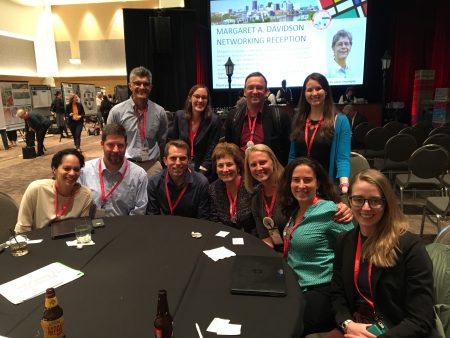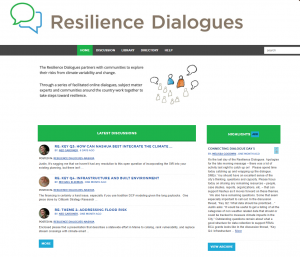Apply now to join our next cohort of Community Science Fellows and Community Leads!

The Resilience Dialogues is a public-private collaboration that works to build climate-resilient communities through facilitated dialogues among scientists, practitioners, and community leaders.

Since 2016, 18 communities have participated in the Resilience Dialogues:
2016:
2017:
2018:
Communities of all types – towns, cities, tribal nations, regional compacts, and more – face risks from climate variability and change, including changing patterns of extreme weather events, shifting growing seasons, more river and coastal flooding, less available water, and greater exposure to wildfires. They want and need to learn how to reduce these risks and build community resilience – to prepare for and recover from these stresses, minimize disruptions to daily life, and even reorganize to thrive in the face of changing conditions. A wealth of scientific information, data, and tools exists that could help manage these risks and integrate climate variability and change into a broad range of planning, engagement, and decision-making activities. However, many communities are often uncertain how to begin, what this information means for them, and where to turn for trustworthy advice. Smaller, isolated, or historically underserved communities especially want personalized technical assistance and to connect with experts who could help them understand their vulnerabilities and what future resilience might look like where they live.
To help meet this growing need, the Resilience Dialogues uses a professionally facilitated, online process to connect community leaders to a network of vetted national experts and helps them work together to understand risks and lay the groundwork for long-term resilience. These online discussions can clarify local risks and opportunities, share strategies that have worked in other communities, identify the most relevant and useful data, tools, and networks, and build shared commitment to future plans and actions.
The Resilience Dialogues is flexible enough to assist:
Regardless of how the conversation starts, the Resilience Dialogues process ultimately aims to include the full fabric of the community.
Communities leave the Resilience Dialogues with a synthesis report that summarizes the key vulnerabilities, opportunities and resources for climate resilience planning identified. In addition, local governments develop:
For More Information:
Communities and Experts Collaborate for Climate Resilience(AGU’s Eos) – 07/11/2017
Public-Private Partnerships Contribute to Resilience Dialogues’ Successful Beta Phase (AGU Blog) – 07/11/2017
Can Networked Knowledge Help Communities Thrive on a Turbulent Planet? (Dot Earth, New York Times) – 10/31/2016
Obama Administration Outlines Path For Climate Change Resiliency (Huffington Post) – 10/31/2016
Fact Sheet: Launching the Resilience Dialogues – 10/31/2016
Fact Sheet: Obama Administration Highlights Opportunities for Building Community Climate Resilience across the Nation – 10/31/2016
AGU’s TEX Program to Lead Climate Effort Launched by White House (AGU’s Eos) – 10/31/2016

Resilience Dialogues participants get together at the 2017 National Adaptation Forum in St. Paul, MN.
By Melissa Goodwin
Communities across the United States – and globally – are negatively affected by climate change. As these impacts grow in the future, communities must make plans and decisions to reduce their vulnerability. If done well, this planning makes a community not only less vulnerable to climate impacts, but also more resilient. Across the federal government, NGO, private sector and climate services community at large, there is more than enough scientific information, data and tools to facilitate resilience. However, many local communities are uncertain how to begin, what available information means for them (and whether it’s even applicable to their situation), and where to turn for trustworthy advice.
Thriving Earth Exchange launched the Resilience Dialogues in 2016 in partnership with the U.S. Global Change Research Program (USGCRP) and White House Office of Science and Technology Policy to address this need. In the time since, it has served 18 communities and engaged approximately 120 community leaders and more than 150 climate and resilience practitioners in facilitated, online conversations. Grounded in local priorities and climate impacts, these conversations are oriented toward identifying next steps and supporting resources to enhance community resilience.
The program has grown and evolved through every iteration of Community Dialogues (cohorts of 3-6 communities who go through the Resilience Dialogues simultaneously), and 2018 has been no exception. The 2018 evolution of the Resilience Dialogue has seen changes in leadership, technology and the way we engage with communities:
 Technology. In 2018, Community dialogues took place on AGU Connect for the first time. User experience and feedback resulting from the previous platform had indicated a need for a more streamlined and reliable discussion space. The new platform made engagement simpler (for example, it allowed mobile access and the ability to tag users and reply directly from email), enabling participants to maximize time spent engaging substantively in their respective dialogues.
Technology. In 2018, Community dialogues took place on AGU Connect for the first time. User experience and feedback resulting from the previous platform had indicated a need for a more streamlined and reliable discussion space. The new platform made engagement simpler (for example, it allowed mobile access and the ability to tag users and reply directly from email), enabling participants to maximize time spent engaging substantively in their respective dialogues.Three communities participated in the most recent round of dialogues in June 2018: Anchorage, Alaska; Carlisle, Penn.; and Nashua, N.H.
The Resilience Dialogues is a public-private collaboration that works to build climate-resilient communities through facilitated dialogues among scientists, practitioners, and community leaders. The American Society of Adaptation Professionals and the U.S. Global Change Research Program work in close coordination on the design, development, and implementation of this effort, along with support from the American Geophysical Union’s Thriving Earth Exchange, the Meridian Institute, and other public and private entities.



(c) 2024 Thriving Earth Exchange